- Home
- Rebecca Lim
The Astrologer's Daughter
The Astrologer's Daughter Read online
PRAISE FOR REBECCA LIM
AND THE MERCY SERIES
‘Subtly beautiful and utterly intriguing, Rebecca Lim’s Mercy series brims with mystery and romance that pull readers through the veil between worlds real and mythical.’ Andrea Cremer, New York Times bestselling author of the Nightshade series
‘Gripping…by the end, you can’t help but wonder who this angel of Mercy will become next.’ Sunday Herald Sun
‘What is compelling about this novel is not only its tightly constructed plot but the lyrical quality of the writing…Not to be missed.’ Reading Time
‘Mercy is a page-turning mystery. Readers will be begging for the sequel.’ Laurie Faria Stolarz
‘This thriller has a creepiness that keeps the pages turning.’ Kirkus Review
‘Mercy[’s] sarcasm, courage and determination will hook readers.’ School Library Journal
ALSO BY REBECCA LIM
Mercy
Exile
Muse
Fury
The Sweet Life
Rebecca Lim is a writer and illustrator based in Melbourne, Australia. She worked as a commercial lawyer for several years before leaving to write full-time. Rebecca is the author of fifteen books for children and young-adult readers, and her novels have been translated into German, French, Turkish, Portuguese and Polish.
textpublishing.com.au
The Text Publishing Company
Swann House
22 William Street
Melbourne Victoria 3000
Australia
Copyright © Rebecca Lim
The moral rights of the author have been asserted.
All rights reserved. Without limiting the rights under copyright above, no part of this publication shall be reproduced, stored in or introduced into a retrieval system, or transmitted in any form or by any means (electronic, mechanical, photocopying, recording or otherwise), without the prior permission of both the copyright owner and the publisher of this book.
First published in 2014 by The Text Publishing Company
Cover and page design by Imogen Stubbs
Cover photograph © Lia & Fahad / Stocksy United
Illustrations on pages 25, 26 and 66 by Rebecca Lim
Typeset by J&M Typesetting
National Library of Australia Cataloguing-in-Publication entry:
Author: Lim, Rebecca (Rebecca Pec Ca)
Title: The astrologer’s daughter / by Rebecca Lim.
ISBN: 9781922182005 (paperback)
ISBN: 9781925095005 (ebook)
Dewey Number: A823.4
This project has been assisted by the Commonwealth Government through the Australia Council, its arts funding and advisory body.
To Michael, Oscar, Leni and Yve.
Always.
Love.
To leave this world behind, is death.
John Donne
PART 1
Your life takes an unexpected turn this week. Stay alert.
1
My mother always called it the eventuality.
Not the maybe, or the probably.
‘It’s going to happen,’ she would tell me calmly. ‘I even know when. It’s a twist in my stars. It’s written there, and we have to accept it.’
My mother, Joanne Nielsen Crowe. She has a name, she’s not a was.
I’m struggling to recall what she was wearing. I’m struggling to recall her exact state of mind. She always drills into me how important every moment is, each one trembling with potential. ‘One minute,’ she will say, ‘one degree rising, can change everything, darling. Remember.’
I have to get the story straight or they’ll think I’m deranged and won’t listen, won’t care. I have to be credible. I have to be coherent, orderly, the way she is.
She’s beautiful. And kind. Small, and sort of frail-looking, but the hardest worker. She never sits still, she always has to be doing something, or making something, with her blue-veined, fine-boned hands. You would forget, after a while, that she was missing five joints on her right one. You just stop noticing, so industrious she is, with what she has left.
‘It’s like you’ve got a condition,’ I tell her in mock disgust, whenever she sews or draws or types, and Mum will laugh.
But she’s a bad cook, a really bad cook. I took over doing that for the both of us when I was ten and she was trying to hold down the country-town bakery job and the thing at the doctor’s clinic that didn’t work out because some sleazebag called Graham kept inventing illnesses just to harass her for a date. It was the only thing I could do to help, cooking, and I’ve just kept doing it, through every move, every new upheaval. We had to leave town, I remember, because of that man, Graham from Rainbow, with his isolated farmhouse, extensive gun collection and pack of pit bulls. There was nowhere to go, everyone knew everyone; they all had an opinion. And everywhere my mother turned, he’d be there; taking up her time, wanting her all to himself. It was suffocating.
People always attach themselves to Mum. They get addicted. It only ever goes one way; always in her direction. Eventually, women and men find themselves craving her, like a drug. And she, we, have to leave and start over.
But for her, there was only ever one love in this life, one drug, and he’s gone. I never really knew my father, although I have this memory: of waking in the dark and walking into the glow of him watching the television, alone in a room somewhere, the sound turned down low so as not to wake the two of us. He’d touched my hair and we’d sat side-by-side in the flickering light. And that’s it. I remember my father as an instance of light, just a presence beside me. But I’m told I have his long, dark eyes and eyelashes, the same dimple in my right cheek. Though the rest of me is some new animal altogether, Mum said once, laughing.
Some new animal. That’s me.
‘There won’t be another like him, you know,’ she’d added, her expression going still and inward, the way it always did when she thought about Dad. ‘It’s kind of nice, to have so much certainty. It means I don’t have to try anymore. I can just be. It’s a relief.’
But that’s what she is known for—trying. Trying to squeeze everybody in; trying to make people feel special, and seen; trying to find the truth in amongst the chaos that makes up the singular state of existence. Mum helps anyone and everyone. She’s always giving away our money and our belongings: to strangers in the park; to people she gets talking to in queues at the bank or down the shops; to weird, dead-eyed Jehovah’s Witnesses with greasy hair who come looking for converts and end up converted themselves to The Way of Joanne. She always says that every single life is a struggle against pre-determination, and she has the proof; case after case, chart after chart, annotated with strange hieroglyphs in her own delicate half-hand. ‘If you let it,’ she always tells people sternly, ‘it will happen. Only the strong-willed can change what’s in the st
ars. It’s always, and only ever, up to you.’
She’s persuasive, Mum. People see the big blue doll’s eyes and the long, white-blonde hair worn with a poker-straight centre part, and don’t realise at first what they’re dealing with. She’s iron and velvet in human form. She’s a magus.
Everywhere we go, word gets around that she’s good, that she never gets it wrong. When she says it will happen, it will; like white water, it will suck you down if you let it. Maybe things don’t pan out the way the person hearing it expects them to, but her readings always fit, always. When people look back at what’s just hit them like a semi bearing down on them standing helpless in the road, the answer would always have been there in their forecast, all along. They just hadn’t been seeing it.
‘You just have to know what to ask,’ Mum will mutter as she works her arcana at night, always at night, with a bowl of tinned soup, or a bitter black coffee on a tray beside her—no milk, no sugar, because she’ll buy me sweeties to eat at the drop of a hat but she won’t touch them herself. ‘You just have to know where to look.’
Strangers come from all over. I open the door, or answer the phone at some God-awful hour, and it is always some new client who is quietly, though more often openly, desperate. And the questions they want answers to are always urgent, always life and death, need-to-know, let me at her, I gotta see her, now, now, now.
And most of them don’t pay. Or can’t. Not in money, anyway.
Mum’s ‘reading room’—where hearts are set at rest, or mended, or broken all over again—is really just our meals area, only separated from our open kitchen by a vinyl-covered breakfast bar. All the reading room contains is an overflowing bookcase, a couple of mismatched chairs and a battered antique card table covered in a plastic tablecloth with a lacy, doily pattern embedded in it. The kind of ‘fabric’ you can buy by the metre from a haberdashery store that’s easy to wipe down.
‘It’s the only way to keep the only table we have in the house clean enough for us to eat off,’ she said once. ‘Fear and stains go hand in hand. You’d do well to remember that in this line of work.’
Our place is full of things like that tablecloth. Things that speak of making-do and desperation and aspiration. When people can’t pay Mum’s fee, there’s almost an unspoken rule that they bring knick-knacks in lieu: pot plants, porcelain dolls, wonkily hand-painted ceramic platters, crystal figurines, feathered dreamcatchers, cheesy vases only big enough for tiny rosebuds, and commemorative coin sets by the score…You get the idea.
These things rest on every available surface in our apartment; line the narrow hallway to the front door like an honour guard comprised solely of kitsch. It has always been that way for as long as I can remember. Necessity causes us to shed things from move to move, but bric-a-brac is drawn to us somehow, as if my mother and I are especially magnetised. There are too many things to make out in the darkening bedroom I am now sitting in; they peek out one behind another, hanging off the cabinetry, probably breeding furiously in the dark, exclaiming to each other, to the silence:
You’re a star.
Thanks a bunch!
Happiness is.
They are the gifts of grateful people with no taste, or no idea. It’s almost like the Franklin Mint, or a home shopping show, has set up a showroom in the place where we live.
‘And I wouldn’t have it any other way,’ Mum said once, firmly, in her end-of-discussion voice. ‘Don’t look at them as things. They are realised emotions: like relief, anger, sadness, gratitude. You are surrounded by thanks—a powerful thing to have about you.’
Yeah. And look at how it has protected her.
I’m like that tablecloth, I’ve decided. A repeating pattern, embedded in plastic, frozen in place. Fully functional and easy-care, but so unlovely.
It’s hell to keep clean, this home. Which is only home because my mother and I were together in it, and not even for long enough to catch breath. Just five lousy months, a record of brevity, even for us. Without Mum here tonight, our tiny apartment seems cavernous and strange, every grinning, dancing bear and ceramic clown wearing an air of darkling menace.
I know I’ve waited long enough, but my hand hesitates over the handset, fearful that I’ve misread her absence as something more than it is. She might be making a special house call, which she has done before. Maybe she’s still stuck on a country train, somewhere, someplace without mobile coverage. It’s possible: she goes to those lengths to see something through, even though she can’t afford to care as much as she does. Mum hates fuss and attention; has made a life out of casting the spotlight back onto others.
What I’m about to do would horrify her.
But she’s never left me alone without explanation. Knowing what’s out there has made her hyper-cautious, made her a great note-taker and note-leaver. On the bathroom mirror, on my bedside table, on the kitchen bench:
Love you.
Take care.
Call me?
It’s been twenty-eight whole hours since her last message went straight to my voicemail. There had been a minute of static, threaded through by the sound of a moving car, maybe the rumble of a man’s voice on the radio? Afternoon noises. Just a mistake message left by her hip hitting her bag, or something inside it shifting and speed-dialling me by accident.
I’ve searched everywhere at home, looked under every stupid trinket and scuffed article of furniture, rifled through her sacred cabinet of futures foretold, and found nothing to say where Mum is, or what she could be doing.
I have a photographic memory for words—I could sit down and write out the whole of page 52 of Chemistry Matters! right now—but Wednesday, the day I last saw my mother, is an immediate blank. Which means she never said where she was going or I would remember. I would.
It’s time to call. Every minute is vital; everything can change in just one minute. She taught me that.
I pick up the handset, the faint purr of the dial tone radiating out of my palm. Night shadows and reflected neon from street signage play across my frozen figure, my olive skin that is more like his was, than hers.
It’s a powerful thing, fear, the not of not-knowing. After they get to know my mother and what she can do, no client ever calls her Jo again, not even Joanne. They’re too afraid to call her anything, really, by the end, when they’re walking away with their progressions and transits and retrogrades clutched in their cold, trembling fingers. All the knowledge brought down by one small woman in a flannel shirt and faded pedal pushers.
Over time she’s come to be known as The Astrologer.
And me? The Astrologer’s Daughter.
When I answer the door, see, that’s what they say.
And though I, more than anyone, should know that the stars are impersonal—they wheel and grind and turn without reference to our wants or needs or desires—my mother, Joanne Nielsen Crowe, didn’t deserve what’s already come to pass, just because she let it.
She let it.
That’s what has shaken me most. She did not fight it. She stopped running, and let it—the eventuality, the black hole she foresaw in her own future that she would never tell me about—take her. When I pressed her
about it once, all she said was: Death isn’t just a person dressed all in black, darl. It’s a place we’re each of us heading to.
I’ve never understood that. But the words have always stuck with me: that she thinks death is a country with its own topography, horizon, stars and moons and planets, just like our own.
In a flurry of bile and nerves, I dial.
‘My name is Avicenna Crowe,’ I tell the woman who answers, her voice crisp and emotionless. ‘I’d like to report a missing person please.’
2
Since I’m in no immediate danger, two officers come out first thing in the morning. A tall, heavy-set man with sandy hair and a compact woman who looks only a year or two out of the academy, still fresh-faced and curious. Both are bristling with holsters, gadgets, ripstop nylon.
They recoil when I answer the door, and my hand rises to my ear. But, of course, it’s too late. The young woman’s eyes narrow thoughtfully on the melted, stumpy thing that is all that remains of my left ear, then on the waxy-looking pattern burnt into my left cheek that pulls my eye down a little at the outer corner. I see her thinking, as clearly as if a thought bubble has formed over her neat, blonde head: Abuse?
Then: Motive?
Before two lots of official ID are even folded away, I find myself babbling, ‘Ipswich house fire, late 90s; it’s on the public record.’
What’s also on record is that my father died trying to save both of us, but I don’t tell them that part. They can look that up themselves.

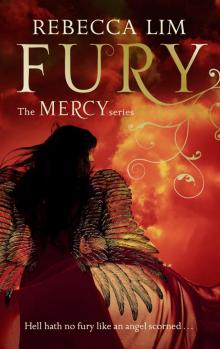 Mercy (4) – Fury
Mercy (4) – Fury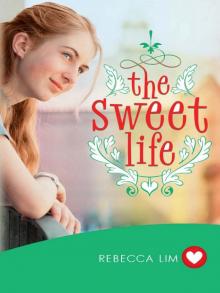 The Sweet Life
The Sweet Life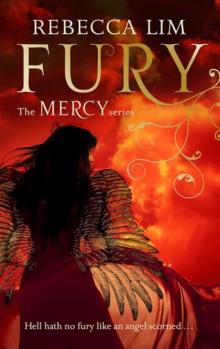 Fury m-4
Fury m-4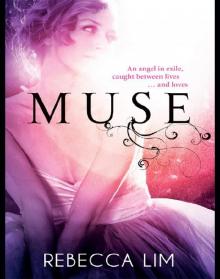 Muse
Muse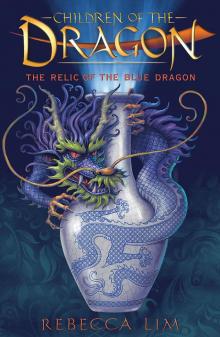 The Relic of the Blue Dragon
The Relic of the Blue Dragon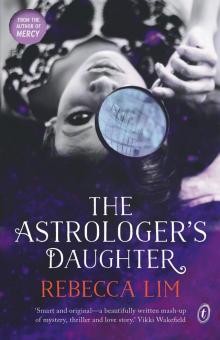 The Astrologer's Daughter
The Astrologer's Daughter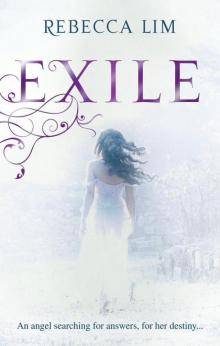 Mercy (2) — EXILE
Mercy (2) — EXILE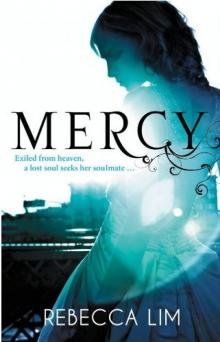 Mercy
Mercy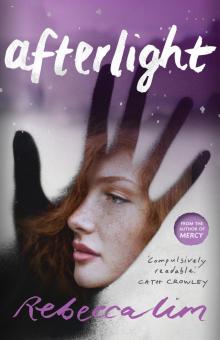 Afterlight
Afterlight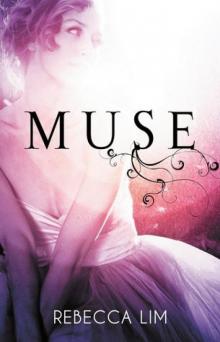 Muse m-3
Muse m-3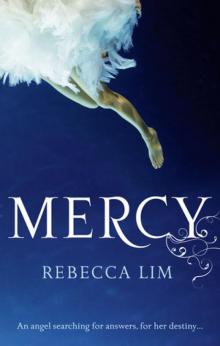 Mercy m-1
Mercy m-1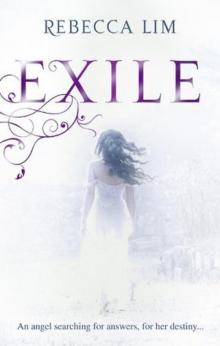 Exile m-2
Exile m-2